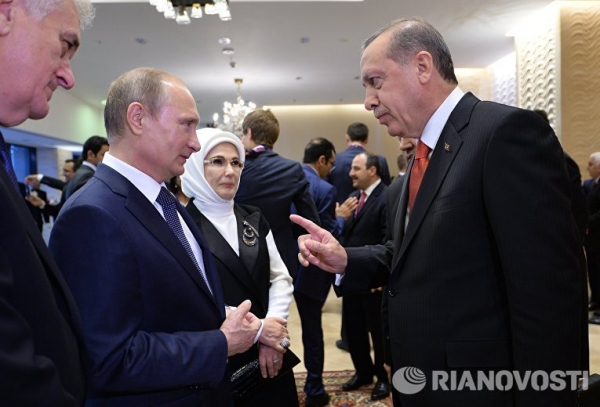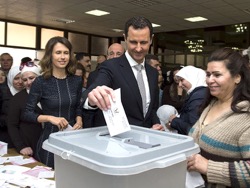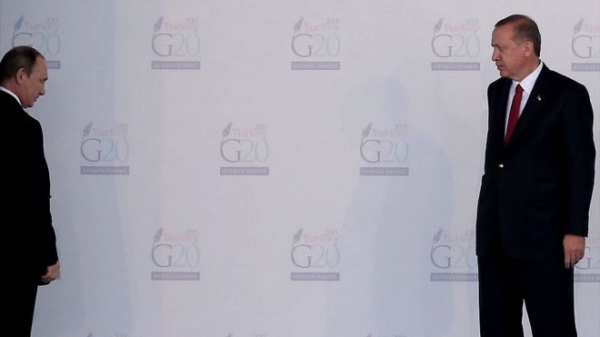 In the higher circles of Ankara there are rumors that the desire of President Recep Tayyip Erdogan to overthrow the regime of Bashar al-Assad there is an element of personal grievance. When between Syria and Turkey had close relations, Asada along with the couple Erdogan’s went on vacation.
In the higher circles of Ankara there are rumors that the desire of President Recep Tayyip Erdogan to overthrow the regime of Bashar al-Assad there is an element of personal grievance. When between Syria and Turkey had close relations, Asada along with the couple Erdogan’s went on vacation.
It is said that later his wife ASMA al-Assad sent my husband the email, in which I begged him never to do. She allegedly said that this pair is not languages that Erdogan is a scumbag, read one book, and that his wife was a nasty woman that is only interested in shopping. The letter attracted the attention of Turkish intelligence. And the rest, as they say, history.
But Assad survived thanks to the Russians. And in November the Turks have shot down a Russian aircraft violating their airspace by as much as 17 seconds. President Vladimir Putin is not the man to forgive wrongs. He read more than one book, he speaks not the same language, and he thinks their actions.
While revenge Russia is limited by a sharp reduction in exports from Turkey. And due to the lack of Russian tourists in Antalya, which was their favorite vacation spot, more than 400 hotels offered for sale. In addition, Assad will probably reclaim the city of Aleppo. And Russia began to support the Kurds seeking to establish their state, whose border will pass along the Tigris river, flowing deep in Turkish territory.
This may cause the commentators to remember the Russo-Turkish war of the 19th century and the other episodes of the Caucasus and the Balkans. But nowadays relations between Russia and Turkey were at least correct, and often warm.
Yes, the statesmen in the era of the tsars wanted to take the city of Constantinople (“Constantinople”). But when they realized what caused these problems, Russia took a step back. It’s better to be weak Turkey, which can be controlled via Autonomous Armenia, and then through Kurdistan than troubled colony or managed by the British a burden in the form of Greece.
In 1833 Russian troops were not given Egyptian-Syrian armies to take Istanbul. And when in 1920 finally collapsed Ottoman Empire, and the British began to side with Greece and Armenia, defending their interests, the Turks, the Russians came to the rescue. Actually, there is no doubt that Turkey would be able to stand without help, which she received from Moscow.
At the national monument on Taksim square in Istanbul there are four known shapes, and the founder of the Turkish Republic Mustafa Kemal Ataturk there all the more noticeable. But the most surprising that one of this Quartet — the first Soviet Ambassador to Turkey Semyon Aralov. He collaborated with the Turkish nationalists, who in 1919 volunteered to establish a small scale business ties with Russia and opposing the plans of the Western allies, zasmatrivatsya in Anatolia.
In the summer of 1920, representatives of Sultan Mehmed VI signed the Treaty of Sevres, which provided for the establishment of Great Armenia, Greater Greece and Kurdistan. But the Sultan had become the ruler of the Emirate obscure.
The contract stumbled upon strong resistance, found support from the Soviets. At the time of its signing in Moscow a meeting took place between the people’s Commissar for foreign Affairs Georgy Chicherin and Ali Fuat Pasha (Ali Fuat Pasha), representing Ankara. They agreed that the Soviets will abandon Armenia, but the Turks will forget about Azerbaijan. Then the Turks got the money and weapons, helped them to defeat the enemies.
Each party distrusted the West. And each was opposed to the most savage manifestations of Islam. Ataturk (not publicly, but privately) regarded him as “a rotting corpse on our neck”. His wife was chatting with the sister of the Soviet people’s Commissar of enlightenment Anatoly Lunacharsky, consulting on how to do literate Turkish peasants.
In 1929 Stalin decided to expel Trotsky, but could not find a country willing to accept him until his consent was not given by the Turks. Trotsky lived there for four years. (His first visitor was a Belgian journalist, Georges Simenon, who discovered that Trotsky’s reading Selina.)
But things went awry in 1945, when Stalin blew the dust from the old tsarist documents. He supported the cause of the Armenians and demanded them to return the three provinces in Eastern Turkey.
In 1947, Turkey received assistance under the Marshall plan, and later joined the General agreement on tariffs and trade and entered into NATO. It brought her a lot of benefits. Stalin’s successor Nikita Khrushchev admitted the mistake of the Soviet policy, but to rebuild the alliances, it was too late. However, after that Soviet-Turkish relations never really bad I have been. And when the Prime Minister of Turkey in 1965 was Suleiman Demirel (Suleyman Demirel), began reasonable cooperation. Of course, the aircraft then no one knocked.
Justifications in favor of the destruction of the aircraft carry a formal character. But Turkish planes frequently violate the airspace of Greece, and no fatal consequences it causes. Turkey’s reaction to the passage of new Russian aircraft is a reflection of something else. Russian defeat in wars against Islam since then, as Ivan the terrible in 1571 took Kazan. Fleeting resentment and discontent today superimposed on historical claims, and it stopped and turned back the Russian-Turkish cooperation, which, for the last 15 years especially, brought great benefits to both parties.
Norman Stone (Norman Stone)








